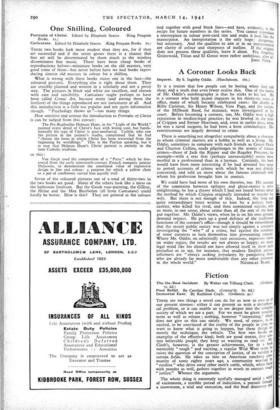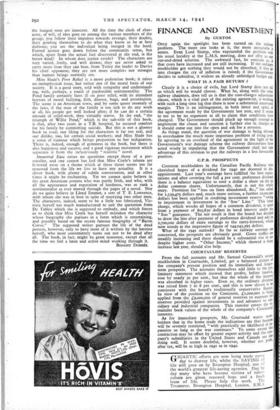Fiction
The Ox-Bow Incident. By Walter van Tilburg Clark. 75. 6d.)
(Gollana.
THERE are two things a novel can do for us now to ease us of our present stresses: either it can present us with a metaphysi- cal problem, or it can enable us to see deeper into the complex society of which we are a part. For we must be given nourish- ment as well as release ; nothing, however " interesting," which does not give us this can satisfy. We need, of course, to be excited, to be convinced of the reality of the people in play, we want to know what is going to happen, but these things SIC merely the technique, the vehicle. The first two books are examples of the effective kind; both are good stories, they eors' tarn believable people, they keep us wanting to read on. Mr. Clark's, however, is the greater achievement, for in a ow' ostensibly " tough " and exciting; a regular Wild West story, be raises the question of the conception of justice, of its validity in certain fields. He takes us into an American ranching an' munity of some eighty years ago, a community worried by " rustlers " who drive away other men's cattle, which, when faced with murder as well, gathers together in wrath to execute rough " justice." Whence the argument. The whole thing is extremely tactfully managed amid a whirj, of excitement, a terrible period of indecision, a pursuit throw a snowstorm, a trial and execution, and the final discovery dial
the hanged men are innocent. All the time the clash of char- acter, of will, of idea goes on among the various members of the group; you follow their impulses towards revenge, their doubts, their goading themselves to do what they know to be at best dubious; you see the individual being merged in the herd. Formal justice goes down before the community sense, but which, apart from the actual fact discovered at the end, is the better kind? In whom does justice reside? The characters are very varied, lively, and well drawn; they are never asked to carry more than they can bear, from Tetley the leader to Davies his chief opponent; they are not more complete nor stronger than human beings normally are.
Miss Slade's Poor Relief is a more pedestrian book; it raises no metaphysical issue, but rather one of the moral basis of our society. It is a good story, told with sympathy and understand- ing, with, perhaps, a touch of pardonable sentimentality. The Pond family certainly fares ill on poor relief, with its attendant horrors of moral bullying, filth, disease, bugs, and prostitution. The scene is an American town, and by some queer anomaly of the laws, if the man of the family is too sick to do any work at all, his people get well looked after; if he can do a certain amount of relief-work, they virtually starve. In the end, " the triumph of Willie Pond," which is the sub-title of this book, is that, after two years in a T.B. hospital, he secured comfort for his family by committing suicide. But this is not a gloomy book to read; our liking for the characters is far too real, and our dislike, too, for certain social workers; and Miss Slade has a sense of humour which brings proportion to her indignation. There is, indeed, enough of grimness in the book, but there is also happiness and success, and a good vigorous movement which separates it from the industriously " realistic " novel.
Immortal Ease raises no questions except those of a per- sonality, and one cannot but feel that Miss Coyle's talents are frittered away on a theme which at these times seems too far removed from the life we live to have any actuality. It is a clever book, with plenty of subtle conversation, and at other tames it might be enchanting. Yet we cannot quite believe in the great American poetess who was partly Irish, and who, with all the appearance and reputation of hardness, was as rank a sentimentalist as ever moved through the pages of a novel. Nor do we quite believe in Lloyd Emmot, a sort of T. E. Lawrence, with whom she was in love in spite of marrying two other men. The characters, indeed, seem to be a little too fabricated, Vic- toria herself too much manufactured to suit the quotation from Dc Tabley which she is supposed to embody, and which forces us to think that Miss Coyle has herself mistaken the character whose biography she pursues in a form which is entertaining, and possibly based on the recent famous biography of " Baron Corvo." The supposed writer pursues the life of the dead poetess, however, only to have most of it written by the heroine herself, who most conveniently turns out not to be dead after all. The book, in fact, might be great nonsense, except that all the time we feel a keen and active mind working through it.
BONAMY DOBREE.































 Previous page
Previous page